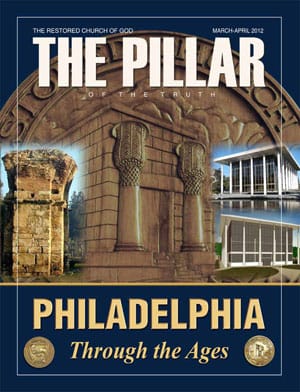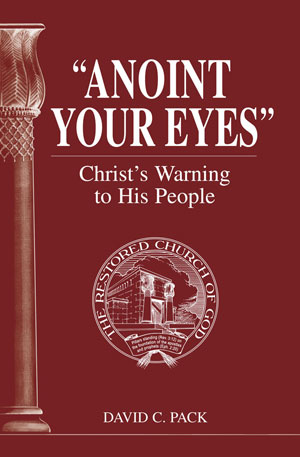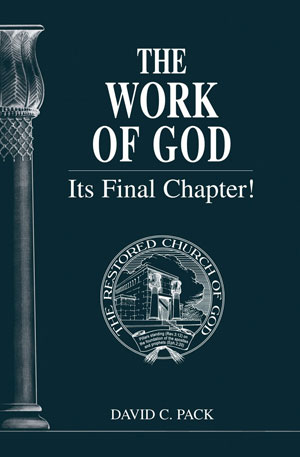Earthquake! A sudden jolt in the dead of night jerks marketplaces, temples and private dwellings, followed immediately by violent shaking. Groggy citizens bolt from their beds and stumble to find safety.
When the intense tremors finally subside, fires rage amid what were successful metropolises seconds earlier. Shrieks and cries from mourners echo throughout the ruins. Thousands are dead.
A massive temblor in AD 17 destroyed cities throughout what is the modern-day country of Turkey. The cities of Sardis, Pergamos and Hierapolis were all nearly leveled.
Historian Cornelius Tacitus recorded the event in The Annals of Imperial Rome: “That same year twelve famous cities of Asia fell by an earthquake in the night, so that the destruction was all the more unforeseen and fearful. Nor were there the means of escape usual in, such a disaster, by rushing out into the open country, for there people were swallowed up by the yawning earth. Vast mountains, it is said, collapsed; what had been level ground seemed to be raised aloft, and fires blazed out amid the ruin.”
Another city struck by the disaster was Philadelphia. While it was not completely destroyed as were other areas, tremors continued to plague the city for decades afterward. Seismic events became so frequent that they were considered a normal part of life.
Greek historian Strabo wrote of the event about three years after it occurred. In The Geography of Strabo, he states that the city was “subject to constant earthquakes.” The writer found it strange that Philadelphians would choose to live in such a place. He continued, “The walls of the houses are incessantly opening, and sometimes one, sometimes another, part of the city is experiencing some damage. The majority of people (for few persons live in the city) pass their lives in the country, employing themselves in agriculture, and cultivate a good soil. Yet it is surprising that there should be even a few persons so much attached to a place where their dwellings are insecure; but one may marvel more at those who founded the city.”
Near AD 100, Christians in Philadelphia (one of the seven congregations mentioned by the apostle John in Revelation 3) lived amid a tough people who did not easily give up—who weathered adversity—who stuck together.
This city’s example, and the Church era it types, provides an abundance of lessons from which Christians today can learn.
Center of Re-education
Before being called Philadelphia, the area was home to a town in the ancient kingdom of Lydia. It was situated on a terrace of the lower slopes of Mt. Tmolus in the Cogamus River Valley, which connected to the Hermus River basin leading out to the sea. At an elevation of 925 feet above sea level, this “city set on a hill” lay just 28 miles southeast from Sardis and 105 miles east of the coastal city of Smyrna. The area was a gateway connecting to the lands of the East, and a major communications hub.
The Lydian city was renamed in honor of Attalus II Philadelphus King of Pergamos who ruled 159-138 BC. “Philadelphus” (meaning “one who loves his brother”) was so named due to his noted loyalty to his older sibling Eumenes II King of Pergamum, who ruled from 197 to 160 BC. Rather than usurp the reign and authority of his brother—when occasion and encouragement to do so was present—he remained loyal. And so the city perpetuated his honorary title “Philadelphus.”
While it has had many names throughout history, today it is called Alasehir.
One more description of the city was given by archaeologist Sir William Mitchell Ramsay in The Letters to the Seven Churches of Asia and Their Place in the Plan of the Apocalypse. While the author did not understand God’s prophetic timeline, he brings out a fascinating point regarding the importance of the city: “Philadelphia was founded more for consolidating and regulating and educating the central regions subject to the Pergamenian kings. The intention of its founder was to make it a centre of the Graeco-Asiatic civilisation and a means of spreading the Greek language and manners in the eastern parts of Lydia and in Phrygia. It was a missionary city from the beginning, founded to promote a certain unity of spirit, customs, and loyalty within the realm, the apostle of Hellenism in an Oriental land. It was a successful teacher.”
Philadelphia was created to teach the laws, religion and language of the Pergamenian Empire when the region came under its governance. In short, it was a “missionary city” of Asia Minor.
Uniquely Important
The book of Revelation (chapters 2 and 3) contains Christ’s messages to seven successive eras, or stages, of the Church, and spans from the time of the early apostles until His Second Coming. Each contains Christ’s brief description of the spiritual condition of these consecutive periods. God knew that these ancient cities would type a corresponding attitude that would exist in the era it represented.
The Philadelphian era of the Church would be markedly different from the one that preceded it (Sardis). Instead of being considered “dead” (Rev. 3:1), this Church era was noted for the characteristics of the city it was named after: brotherly love, faithfulness and patient perseverance, even at times of upsets and upheavals. It was to be vibrant with life—and the impact of its Work was prophesied to reach far and wide!
While all seven Church messages contain important lessons, what is written about the congregation at Philadelphia should carry additional weight for those in The Restored Church of God because it is the era true Christians today must emulate.
Read Jesus Christ’s words to Philadelphia: “These things says He that is holy, He that is true, He that has the key of David, He that opens, and no man shuts; and shuts, and no man opens. I know your works: behold, I have set before you an open door, and no man can shut it: for you have a little strength, and have kept My word, and have not denied My name.
“Behold, I will make them of the synagogue of Satan, which say they are Jews, and are not, but do lie; behold, I will make them to come and worship before your feet, and to know that I have loved you. Because you have kept the word of My patience, I also will keep you from the hour of temptation, which shall come upon all the world, to try them that dwell upon the earth.
“Behold, I come quickly: hold that fast which you have, that no man take your crown. Him that overcomes will I make a pillar in the temple of My God, and he shall go no more out: and I will write upon him the name of My God, and the name of the city of My God, which is new Jerusalem, which comes down out of heaven from My God: and I will write upon him My new name. He that has an ear, let him hear what the Spirit says unto the churches” (Rev. 3:7-13).
Much has been written about these seven verses in Mr. David C. Pack’s books to the splinter groups of the Worldwide Church of God—particularly in “Anoint Your Eyes” – Christ’s Warning to His People. For this reason, a thorough explanation of every aspect of these verses will not be included here.
One point, however, sets this era’s “message” apart from all the rest.
When studying the preceding periods of Church history, it can be difficult to accurately learn about the Church leaders of those times, such as Polycarp, Constantine of Mananali, and Peter Waldo. These men are inspiring examples of true Christians, but other than precious few historical documents, we know relatively little about them.
This is not the case with the leader of God’s Work during the Philadelphian era.
Inspiring Recent History
Because the Philadelphian era began less than 100 years ago, many eyewitnesses are still alive to testify about what was achieved. In addition, much of the early history was recorded in the Autobiography of Herbert W. Armstrong: how he was called in the fall of 1926, and converted in the spring of 1927. How what began in October 1933 with a congregation of 19 people, including Mr. Armstrong’s own family of six, soon increased in size, scope and reach. How the Radio Church of God became the Worldwide Church of God in 1968, and Ambassador College grew into three campuses on two continents.
Truths that had been lost to the Church were restored, and the gospel of the kingdom of God went out in power to the entire world. God’s government was again set in place in Christ’s Body.
At its zenith, the Work accomplished by the WCG was immense. Millions of pieces of literature teaching God’s truth were given away, and millions tuned into The World Tomorrow program on radio and television. The Plain Truth magazine had millions of subscribers.
The scope of Mr. Armstrong’s ministry was unprecedented in the almost 2,000 years since the Church was founded on Pentecost AD 31. Truly, God had set before the Philadelphian era “an open door” that no one could shut (Rev. 3:8).
Of course, this phase of God’s Work ended soon after Mr. Armstrong’s death in 1986. The great falling away of II Thessalonians 2:3 began, and the following years struck the Church like a spiritual mega-earthquake—one that had a similar effect as the one that hit ancient Philadelphia in AD 17. A great many were swallowed up in the initial “quake,” and its many “aftershocks.”
Yet we should never allow what occurred during Mr. Armstrong’s ministry to become a mere account in Church history. Notice Revelation 10: “You must prophesy again before many peoples, and nations, and tongues, and kings” (vs. 11). (To more fully understand this topic, read chapter 13 of Mr. Pack’s The Work of God – Its Final Chapter!)
The Restored Church of God is doing what ancient Philadelphia did—rebuilding what was destroyed. The Work done in the 20th century was a forerunner of what will yet occur. Do not forget that Mr. Armstrong believed at the end of his life, “The greatest work lies yet ahead…”
That time is fast approaching!
Consider. God’s government is again in place. All of the literature has been re-written. Ambassador Center has been established. The World to Come program will soon be on television. A beautiful campus will be built. The list could go on...
Whenever you hear about the accomplishments of the Philadelphian-era 20th-century Work of God, remember that God states it will all happen again!
Known for Brotherly Love
Another unique opportunity presents itself because the history of the Philadelphian era is incredibly well documented: we can more directly learn from the mistakes of the past. While Christ did not have any criticism for Philadelphia in Revelation 3, one lesson should loom large in our thinking.
God could have chosen to call this era by another name, perhaps one that more reflected the size of the Work it would do. But He chose to call it Philadelphia, which denotes brotherly love.
Many members of the Church during the 20th century seemed to reflect this meaning. Church members regularly invited one another to each others’ homes for meals and fellowship. There were frequent activities: sports, socials, youth camps, and Spokesman Clubs. In countless instances, genuine care and concern expressed themselves in clear ways. In general, members recognized and treated one another as brothers and sisters of a “Church family.”
During this time, the Work zealously warned the modern-day descendants of ancient Israel of coming national punishment. This was done so that those who heeded could be spared.
The apostasy revealed that for most WCG members this was only an outward show of brotherly love.
In the end, this served God’s purpose. The Work at that time needed the funds of what were essentially unconverted “in-house co-workers.” And the apostasy had to occur in order to test God’s people and usher in the Laodicean era of today (Rev. 3:14-22).
Yet Philadelphian Christians cannot allow their brotherly love to be only “skin deep.” We must also develop and grow in true godly love, which in the Greek is the word agape.
Notice the definition of agape from Thayer’s Greek-English Lexicon of the New Testament: “affection, good-will, love, benevolence.” The lexicon summarizes one use of this word as “the love of God towards men.” Other Bible passages show this word can also signify the “love of Christians towards Christians.” (See II Corinthians 2:4 and Philemon 1:5.)
This means agape includes spiritual affection toward others—godly brotherly love!
Read part of I Corinthians 13, commonly referred to as the “love chapter,” replacing the term “charity” (which is agape throughout) with “godly love”: “Though I speak with the tongues of men and of angels, and have not [godly love], I am become as sounding brass, or a tinkling cymbal. And though I have the gift of prophecy, and understand all mysteries, and all knowledge; and though I have all faith, so that I could remove mountains, and have not [godly love], I am nothing. And though I bestow all my goods to feed the poor, and though I give my body to be burned, and have not [godly love], it profits me nothing” (vs. 1-3).
Without true brotherly love, all of our actions profit us nothing!
The chapter continues: “[Godly love] suffers long, and is kind; [godly love] envies not; [godly love] vaunts not itself, is not puffed up, does not behave itself unseemly, seeks not her own, is not easily provoked, thinks no evil. Rejoices not in iniquity, but rejoices in the truth; bears all things, believes all things, hopes all things, endures all things. [Godly love] never fails…” (vs. 4-8).
Love Motivates
This true brotherly affection should certainly be extended to those in splinter groups—those who saw a great destruction come upon “the city set on a hill” that was the Worldwide Church of God. They fled in all directions, some even back into the world. They have experienced multiple aftershocks still emanating from the earthquake that struck the Church—and are in most cases still experiencing further breakups of groups and having to flee again. Philadelphian Christians should have outflowing love and concern for these brethren.
Spiritual brotherly love can also be extended to the entire world. Be motivated daily by the fact that God wants “all men to be saved, and to come unto the knowledge of the truth” (I Tim. 2:4). Remaining focused on the kingdom of God—and the part you can play in it—is the ultimate expression of “agape.”
Realize that the labor will continue to be difficult and there will be obstacles to overcome. Not all of the “earthquakes” are behind, and the coming years will be tough. But the love of a Philadelphian-minded Christian urges him on in the face of opposition and hardship. His heart is set to help do his part in rebuilding the Church and Work. He sees the door is still open and time is short. He does not flag in his commitment. He keeps holding fast no matter how long it takes.
A true Philadelphian understands that to be of this era means to love his fellow man, and his brothers and sisters in Christ who are wandering in the wilderness of the splinters. He warmly and sincerely welcomes all whom God is still calling from the world and those who have been and will be grafted back into the Body of Christ.
May this describe all of us!
It will take concerted effort to remain zealous in God’s Work. It will take determination to hold fast to the truths of God, especially in the tumultuous times just ahead. Look back to the tenacity of ancient Philadelphia and to the zeal of true Christians during the 20th century. Let their examples exhort you to press on.
Determine to be a pillar in the Church and set your will to never give up. Remember, faithful Christians today must continue in the Philadelphian mindset by exhibiting true brotherly love for all of mankind.


















